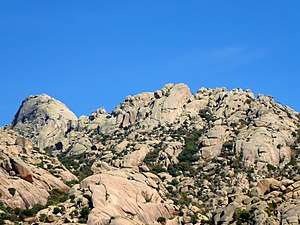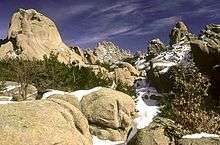La Pedriza
La Pedriza is a geological feature on the southern slopes of the Guadarrama mountain range of great scenic and leisure interest. Access is from Manzanares el Real, a municipality in the northwest of the Community of Madrid (Spain). Geological forces have created a remarkable boulder field of strangely eroded granitic outcrops, and nearly a thousand rock climbing routes of all difficulties are available to rock climbers, making it an immensely popular locale for rock climbers, especially due to its proximity to Madrid. Hiking is also popular in La Pedriza, especially on weekends.
| La Pedriza | |
|---|---|
 View of La Pedriza. | |
| Highest point | |
| Coordinates | 40°46′16″N 3°52′32″W |
| Geography | |
 La Pedriza Location in Spain | |
| Location | Spain |
| Parent range | Guadarrama mountain range |
It is one of the largest granitic ranges of Europe and holds numerous peaks, rocky cliffs, streams and meadows. The 32 square kilometres occupied by La Pedriza lies within the Regional Park of the high river basin of Manzanares, the largest park of the Community of Madrid. In this zone, vegetation is sparse, but there are Mediterranean shrubs like the rockrose, and alpine varieties like fabaceaes. The fauna is rich in birds of prey; the breeding colony of over 100 pairs of griffon vultures is the largest in the Madrid area.
This natural area has been the scene of some movie shootings such as El Cid,[1] The Fall of the Roman Empire,[1] or Conan the Barbarian.[2]
Restrictions In June 2016 new restrictions were introduced to protect the park. Swimming in the natural pools has been prohibited and there is a heavier restriction on access to the park. In the summer, until September 30, access to the carpark in Canto Cochino is restricted to 7.30-9.30am and 18.30-22.30 or until all spaces are filled (270). During June, July, August and September, no vehicle is permitted to be in the park overnight. From October 1 to May 31, entrance to the park is until 10.30am and after 4pm on weekends and bank holidays. There is no restriction on weekdays or exit restrictions.[3]
- Panoramic view of La Pedriza.
- Los Fantasmas ("The Ghosts"), highest peak in la Pedriza Anterior
 Winter view of La Pedriza's peaks.
Winter view of La Pedriza's peaks.
References
- Leralta, Javier (2002). Madrid: cuentos, leyendas y anécdotas. 2. Madrid: Sílex. pp. 50–51. ISBN 84-7737-100-8.
- "'Conan el Bárbaro', tan sangrienta como insulsa". El País. RTVE.
- http://www.madrid.org/cs/Satellite?c=CM_InfPractica_FA&cid=1142606411860&pagename=ComunidadMadrid%2FEstructura&pv=1354436379238
| Wikimedia Commons has media related to La Pedriza. |